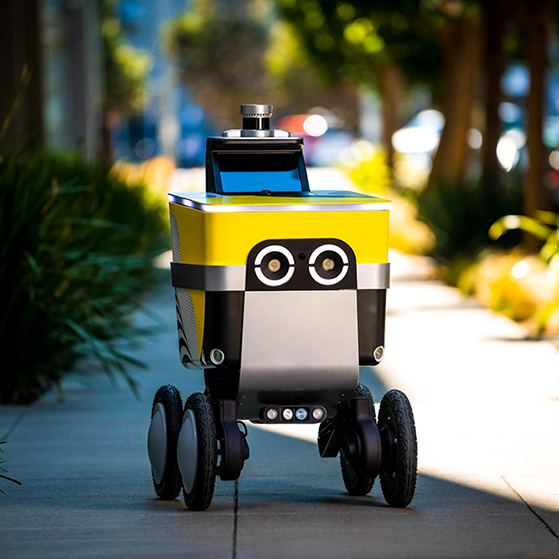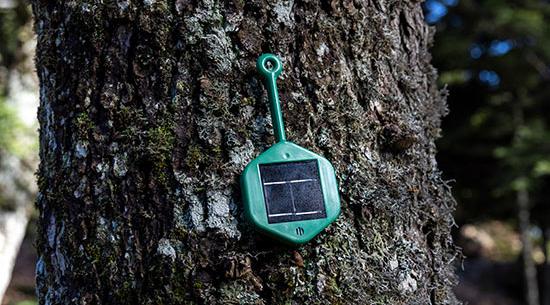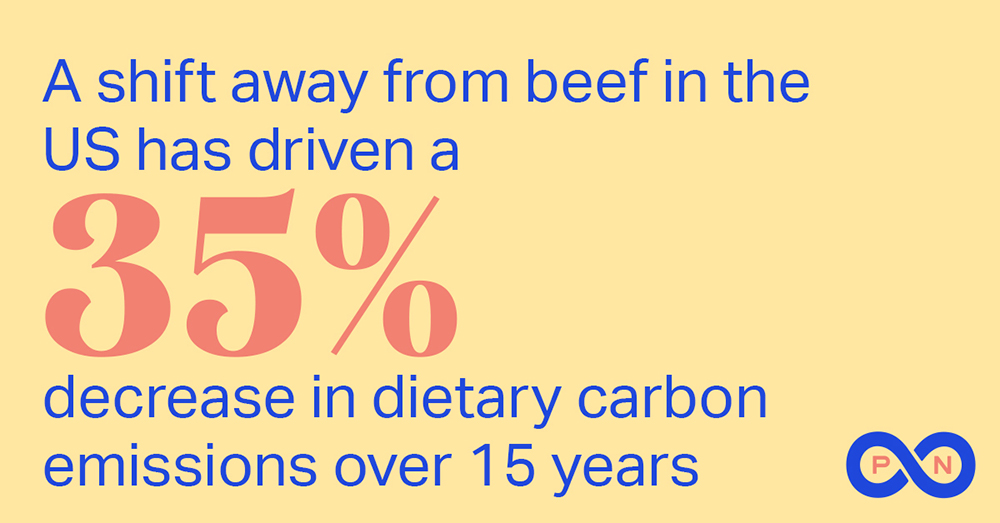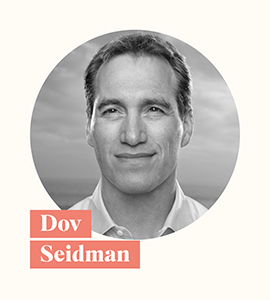Volcanoes are erupting in The Philippines, but on-fire Australia received some welcome rain. The Iran war cries have been called off and The Donald’s military powers are about to be hamstrung by the Senate. Meanwhile, his impeachment trial is starting, and we’re all on Twitter for a front-row seat.
What Could Go Right? 2022’s coolest, cutest robots
That are coming to improve our lives. Plus, what you can do to help the gun crisis, and the Ebola virus is declared “defeated.”
This is our weekly newsletter, What Could Go Right? Sign up here to receive it in your inbox every Thursday at 6am ET. You can read past issues here.
The robots are coming
“We live amongst technology,” artificial intelligence (AI) expert Ayesha Khanna tells us in our latest podcast episode, Wisdom for Smart Tech. It’s a discussion that strikes a balance between the starry-eyed techno-optimists who ignore the real problems new technology brings with it and the dystopian view of a fast-coming robot takeover that poo-poos any and all tech advancements. There is a wise way to deploy smart technology, Khanna says, and if we follow it, we can reap the benefits while preempting risks.
In other words, the best case scenario is: the robots are coming—to help us. Khanna calls them, AI, and other cutting-edge technology “our little assistants.” If that makes the tech sound oddly adorable, it’s because many of these little assistants now are.
There’s a fully autonomous sidewalk delivery bot, for example, that can bring you your dinner and even communicate with pedestrian traffic. Its main benefit is that it takes cars off the road, cutting down on emissions and traffic accidents. In New York, the government is giving a robot that looks a bit like the Pixar lamp to the elderly to alleviate loneliness. That robot, called ElliQ, chats with its users, altering its responses to suit an individual’s personality—it might tell more jokes to a good-humored person, for instance—and remembering “key details” about their lives. It can also help manage contact with friends and family and keep “track of health goals like exercise and medication.”


Serve Robotics’ fully autonomous sidewalk bot (L) and Intuition Robotics’ ElliQ (R)
We’ve also written about Robin the Robot before here at The Progress Network, a robot that visits pediatric patients to play with them and explain upcoming medical procedures.These tiny robots that are smaller than a flea and move with the help of lasers might be peak robot cute. And for something in the opposite direction, check out the most “metal” robot we’ve ever seen by scrolling down to our signoff at the end of the newsletter. (The robot in question may or may not be shaped as a goat.)
As for AI, we mentioned in the links section of a previous newsletter the good news from Google Translate, that they are adding 24 more languages, including several African ones. Google Translate is far from perfect, but as anyone who has traveled or moved to a new country knows, also incredibly useful. And we are sure you’ll be thanking the AI gods when they free you from the existence of traffic jams. Over in Greece, which is frequently blanketed in forest fires when summer temperatures are blazing, telecommunications company Vodafone is testing a “Smart Forest” device that uses AI, sensors, and cameras to detect smoke and temperature changes and send an immediate alarm to authorities. Last summer, out-of-control forest fires there led to blackouts, mass evacuations, and the death of people and animals.

All of this technology, of course, requires regulation. That’s the “wisdom” bit. In early May, Europe took a strong first step by putting out the AI Act, which provides accountability guidelines for companies using AI. The rules become more or less stringent depending on how risky each use case is deemed. A company using AI to, say, sell purses online, Khanna explains to us in the podcast, receives the lowest level of scrutiny. A company selling facial recognition software that might lead to wrongful incarceration, on the other hand, receives much more. It’s the kind of oversight that would make sure a robot like ElliQ or Robin, for example, isn’t selling health information. It’s exactly the kind of thoughtful process we need to land ourselves in that best case scenario with our little assistants.
What can you do to help the gun crisis?
We were serious when we said that your attention to the gun crisis in the United States is a gift. NewsWhip data provided to Axios shows that social media interaction fell quickly after the news about Uvalde broke on May 24. We wonder how much exhaustion, overwhelm, and defeatism has to do with that. Vox had a good piece imploring us not to give into defeatism, reminding us that “social reform takes time.”
We’re seeing a lot out there about framing gun fatalities, including suicides, as a public health issue instead of a policy issue, which might quiet some of the fracas between the two sides of gun control vs. gun rights. Katherine J. Wu’s interview in The Atlantic with an ER doctor with too much experience in treating gunshot victims was fantastic in emphasizing both the public health framing and what you can do as an individual and local community to cut down on firearm injuries and fatalities. It might surprise you to learn that you could very well make a difference simply by becoming involved in a community garden.
“Anyone who thinks that we are going to get rid of firearms in this country is not living in the United States that I live in,” the doctor and public health expert, Megan Ranney, told Wu. “Some absolutist nirvana is never going to happen. Instead, everyone needs to work with communities to create solutions that creep forward progress.”
Speaking of local action, over the weekend the Sacramento, California police department took a look at two problems—the proliferation of guns and extremely expensive gas—and came up with one excellent solution. On Saturday they ran a “gas for guns” buyback, offering $50 gas gift cards to anyone who wanted to turn in a gun, no questions asked. It was such a success that they ran out of gift cards within 45 minutes. They kept going for another few hours, and at the end of the day had received almost 150 guns from community residents, many of whom decided to turn them in due to lack of ability in how to use or store them properly.
The article above mentions that in Brooklyn, New York, as well, a church joined forces with Junior’s restaurant to run a gun exchange event. Rifles, shotguns, and airguns fetched a $25 bank card. Assault rifles and handguns, a $200 bank card and an iPad. What could you do in your area?
Globally, the world is going in the right direction in regard to gun-related suicide rates, which have declined in the last 30 years. “In the US,” this New Scientist article says, “rates are lower than they were in 1990, but they have been climbing since 2006.” The decline, experts think, “probably reflects increased firearm restrictions around the world.”
One of those countries with increased firearm restrictions is Canada. Despite our feelings about what’s going on in the US, we can still say good for you to our northern neighbors, where legislation was announced for a national freeze on buying and selling handguns and a ban on toys that look like them.
And there’s at least one positive change in the US of A: Americans are in no mood anymore to donate to the National Rifle Association (NRA). Donations to the NRA have hit a 15-year low.
Before we go
One year ago we asked in this newsletter whether we had seen the last large Ebola outbreak. Now, the Congolese professor who discovered Ebola says that “. . . it is defeated. It is preventable and curable.”
Two-sided, rotating solar panels means they work a lot better in the snow. We’re in the early days of developing nighttime solar power (yes, that’s now a thing). And NASA is funding research into “solar sails” that would propel spacecraft using sunlight, like a sailboat works with wind. Success would mean that we could explore farther and farther into space without fuel limitations holding us back.
There really are some areas where US lawmakers do work together, and opioid addiction is one of them. There’s a bipartisan effort to disincentivize doctors to give opioid prescriptions by expanding coverage for non-opioid pain management techniques.
Wow, Pfizer, we didn’t expect this from you. The pharmaceutical company will “supply all its current and future patent-protected medicines and vaccines on a not-for-profit basis to 45 lower-income countries.” They’re also in talks with other “big drugmakers” to see if they can make this industry standard. Is this a weird silver lining to the unholy profits Pfizer raked in during the pandemic—they have so much money that they feel they can afford to be generous?
Below in the links section, a Dutch startup creates a fully biodegradable casket, an Israeli firm tackles traffic with math, and more.

Wisdom for Smart Tech | S2 Ep. 10

Web3 is seen by many as the future of the internet. Others understand the rise of artificial intelligence (AI) as the first step to a robot takeover. Where’s the balance between these two reactions? This week, AI expert, CEO of ADDO AI, and a member of the World Economic Forum’s Global Future Council on Media, Entertainment, and Culture Ayesha Khanna joins us to wade through the hype around cryptocurrency, decentralized finance, robots, and more and talk through global leadership on new tech rollouts. | Listen to the episode
Progress, Please
(Found good news? Tweet at us @progressntwrk or email.)
Other good stuff in the news 🚦
Environment:
- Plastic packaging might be biodegradable after all | DW
- Volvo preps for launch of first electric trucks made with fossil-fuel-free steel | GreenBiz
- China triples solar investments as clean energy push accelerates | Bloomberg
- A 15-year snapshot of US diets reveals a shift away from beef | Anthropocene
- Kelp is weirdly great at sucking carbon out of the sky | The Atlantic
- Indonesia’s Komodo National Park is a ray of hope for reef mantas | Mongabay
- Shareholders win majority support for climate proposals at Exxon and Chevron | Grist
- Rooftop solar takes off in Spain, aiding Europe’s bid to shun Russian gas | Bloomberg
- The living coffin that transforms your body into compost | Positive News
- Global electric car sales have continued their strong growth in 2022 | IEA
- After millennia of agricultural expansion, the world has passed ‘peak agricultural land’ | Our World in Data
- China launches large-scale ‘seawater rice’ transplanting to boost output | Global Times
Science & Tech:
- Traffic jams just a maths problem, says Israeli AI firm | France 24
- Watch a robotic shoulder practice twisting and stretching human cells | MIT Technology Review
- Scientists try to bring Australian ‘tiger’ back from extinction | The Washington Post
- Five fingers are useful. Why not go for six? | Reuters
- Scientists recreating the experience of human touch for prosthetic-wearers | National Geographic
Politics & Policy:
- Ban has prevented 2 million surprise medical bills so far, insurers say | Axios
- Four new states will extend postpartum Medicaid coverage to 12 months | The 19th
- What happened when France sent low-income kids to wealthy schools | Reasons to Be Cheerful
- Since George Floyd’s murder, new ways of policing have been spreading | The Economist
Covid & Public Health:
- The global impact of terrorism continues to decline (the US recorded its lowest score since 2012) | ReliefWeb
- Monkeypox outbreak is ‘containable,’ WHO says as it confirms more cases | CNBC
- US in process of releasing monkeypox vaccine from national stockpile for ‘high-risk’ people, CDC says | CNN
- Three African countries have eliminated ‘sleeping sickness’ as a public health problem | World Health Organization
- The future of birth control | Neo.Life
Society & Culture:
- South Korean workers turn the tables on their bad bosses | The New York Times
- Senate confirms first-ever Native American federal judge in California | HuffPost
- Starbucks workers are winning 90% of their union elections | Jacobin
- ‘Mind blowing’ ancient settlements uncovered in the Amazon | Nature
TPN Member originals 🧠
(Who are our Members? Get to know them.)
- When real life is horrific, how much horror should the media show? | James Fallows
- What Steve Kerr and Beto O’Rourke are exposing for all the world to see | Peniel E. Joseph
- Gun violence is like what segregation was. An unaddressed moral stain | John McWhorter
- My love letter to you after Uvalde | Valarie Kaur
- I thought Putin invaded only Ukraine. I was wrong | Thomas L. Friedman
- Russia or China? The US has a choice to make | Zachary Karabell
- Why Congress’ big UFO hearing made me more positive about faster human progress | James Pethokoukis
- The two choices that keep a midlife crisis at bay | Arthur C. Brooks
- Success, happiness, and deep purpose | Arthur C. Brooks
- We should be rational optimists | Steven Pinker
- Bringing enlightenment values to the Middle East | Faisal Saeed Al Mutar
- The fracturing of the human mind | Jonathan Haidt
- Robert P. George on free speech, philosophical liberalism, and conservatism after Trump | Yascha Mounk
- On progress studies | Jason Crawford
Department of Ideas 💡
(A staff recommendation guaranteed to give your brain some food for thought.)
The philosopher who resisted despair | Vox
Albert Camus and the search for solace in a cruel age.
Why we picked it: It offers an “antidote to despair” via Camus, arguing against treating people as political abstractions and for nurturing a spirit of common humanity. —Brian Leli
New Member Alert
Dov Seidman is the founder and chairman of both the ethics and compliance company LRN and The HOW Institute for Society, which builds and nurtures moral leadership. His groundbreaking book How: Why HOW We Do Anything Means Everything is a New York Times bestseller that offers a philosophical framework for individual and organizational behavior in a world that is increasingly interconnected and interdependent. His ideas on out-behaving have been used to impact how businesses operate, cities are run, soldiers are trained, school systems prepare their students and staff, and professional sports franchises use values for competitive advantage.
Read an interview with Dov about what great leadership looks like.
Upcoming Events
- What Works Summit 2022: Truth & Trust | Michael Green & Zachary Karabell | Ends Today
- Bloomberg Technology Summit: Looking Forward 2022 | Roy Bahat | June 8
- Breakthrough Dialogue 2022: Progress Problems | Ted Nordhaus | June 22–24
Until Next Time
Until next Thursday, join us in wondering how we can get this job as goat robot test rider. 🤘



